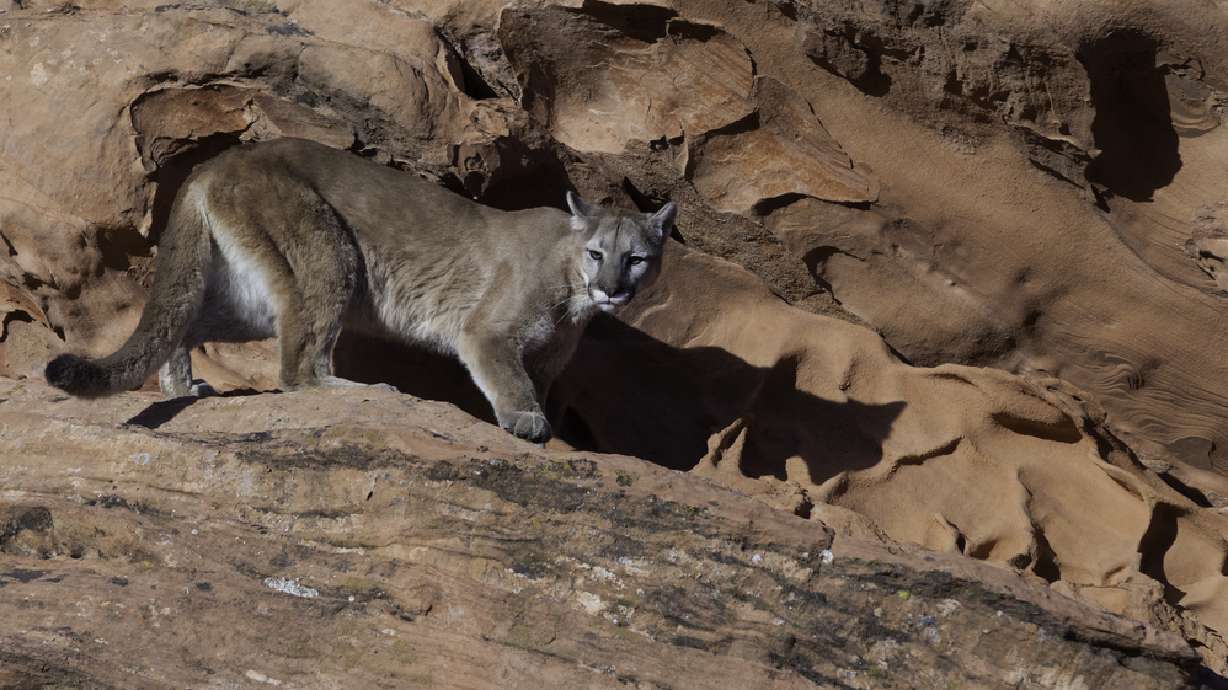Estimated read time: 4-5 minutes
This archived news story is available only for your personal, non-commercial use. Information in the story may be outdated or superseded by additional information. Reading or replaying the story in its archived form does not constitute a republication of the story.
SALT LAKE CITY — A wildlife protection nonprofit is calling for Utah Gov. Spencer Cox to veto a bill that opens the door for year-round cougar hunting in the state.
HB469 cleared the Utah Legislature last week after a third substitution of the bill was introduced on March 1. The update, proposed by Sen. Scott Sandall, R-Tremonton, removes the state's current program so that anyone with a hunting license can harvest cougars throughout the year without a tag.
"We're getting an increase in our cougar numbers across the state," Sandall said, as he introduced the changes on the Senate floor.
The substitution, he added, also provides a "cleanup" to the state's trail camera ban during the hunting season. It's still illegal to transmit trail camera images or other information on public lands that are used for hunting from July 31 through Dec. 31 every year. But cameras that use internal data can be used on private lands for taking wildlife, as long as they are not transmitting data.
Trail cameras can also continue to be used on public lands for research purposes, including by nongovernment organizations, educational institutions and people who are "conducting research in conjunction with" the Utah Division of Wildlife Resources. They can also be used by "active agricultural operations" to monitor bears or cougars that may cause any livestock depredation.
The bill also calls for a study of pre-charged pneumatic air rifles in hunting, among other changes. The Utah Senate passed the bill with a 21-6 vote before the Utah House of Representatives voted 57-13 in favor. Barring a veto, the new law will take effect on May 3.
But groups like the Western Wildlife Conservancy are calling on Cox to veto the bill over the year-round cougar provision. Kirk Robinson, the group's executive director, wrote in an email that it lacks "science-based rationale and is ethically fraught."
"Utah deer herds suffer from drought and loss of winter range, not from predation since cougars focus on taking animals that are too weak, sick or old to be able to reproduce," he wrote Thursday. "The loss of winter range is due to a growing population of humans. It is irrational to punish cougars for this. In fact, fewer deer will naturally result in fewer cougars."
The Utah Division of Wildlife Resources currently operates predator management strategies that allow for more cougars to be taken in areas where mule deer are struggling the most. Faith Heaton Jolley, the division's spokeswoman, said deer populations in those areas have had some increases in recent years.
The division is currently reviewing the legislation to determine how the bill will impact the current rules and process regarding cougar hunting, Jolley said. She adds that the division will work alongside the Legislature, the Utah Wildlife Board and through a public process to "update our management and rules accordingly."
There are some other details that need to be sorted out, such as how many cougars one person can harvest annually. There will still have to be a provision where hunters report their kills so state wildlife officials can estimate harvest rates and determine how the law is impacting cougar populations in the state, too, Jolley said.
Utah's cougar population is a bit of a mystery because the species can be quite elusive. The division estimated in 2019 there were at least 2,000 adults that were at least 2 years old or older, but that figure doesn't include kittens or yearlings, and isn't an exact count of adult cougars either, she explained.
However, the bill, if signed, won't eliminate the rest of Utah's cougars. While the division reported that 667 cougars were harvested in 2021, Jolley said the figure fell back down to 491 in 2022, despite "few indicators" that cougar populations changed, because they aren't easy to hunt.
The species will also continue to be protected and managed in the future.
"We'll work to make sure that cougar populations aren't impacted," Jolley said. "We want to keep that balanced ecosystem of cougar hunting and deer populations, so we're right now working through that public process with the wildlife board to update those managements and rules. ... So, I don't think it's going to be an overnight cougars are instantly wiped out kind of situation."
Cox has until March 23 to veto any bills approved during the legislative session that wrapped up on March 3.
Contributing: Britt Johnson









